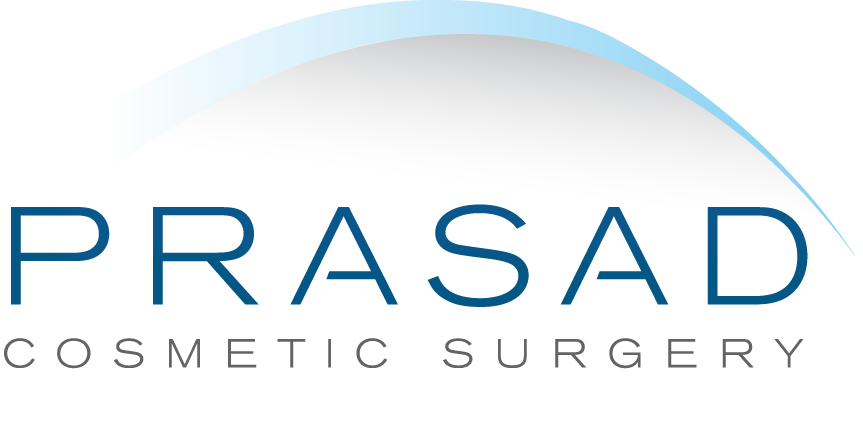Schedule Your Consultation with Dr. Prasad Here
- Home
- About Dr. Prasad
- Face & Eyes
Eyelifts
- Eyelid Surgery
- Eye lift Before and After Photos
- Asian Eyelid Surgery
- Upper Eyelid Surgery
- Upper Eyelid Hollow / Lower Brow Hollowing
- Under Eye Bag Surgery
- Eyelid Ptosis Surgery
- Transconjunctival Blepharoplasty
- Under Eye Fillers
- Eyelid Surgery Revision Specialist
- Thyroid Eye Disease
- Tear Trough Implants
- Eye Lift Questions and Answers
- Body
- Injectables
- Laser
- Hair Restoration
- Photos
- Hair Restoration Before and After Photos
- Eye lift Before and After Photos
- Upper Blepharoplasty Before and After
- Ptosis Surgery Before And After
- Facelift Before and After Photos
- Lip Enhancement Before and After Photos
- Under Eye Filler Before and After
- Blepharoplasty Before and After
- Lower Blepharoplasty Before and After Photos
- Eyelid Surgery Before and After
- Double Eyelid Surgery Before and After
- Contact Us
- Home
- About Dr. Prasad
- Face & Eyes
Eyelifts
- Eyelid Surgery
- Eye lift Before and After Photos
- Asian Eyelid Surgery
- Upper Eyelid Surgery
- Upper Eyelid Hollow / Lower Brow Hollowing
- Under Eye Bag Surgery
- Eyelid Ptosis Surgery
- Transconjunctival Blepharoplasty
- Under Eye Fillers
- Eyelid Surgery Revision Specialist
- Thyroid Eye Disease
- Tear Trough Implants
- Eye Lift Questions and Answers
- Body
- Injectables
- Laser
- Hair Restoration
- Photos
- Hair Restoration Before and After Photos
- Eye lift Before and After Photos
- Upper Blepharoplasty Before and After
- Ptosis Surgery Before And After
- Facelift Before and After Photos
- Lip Enhancement Before and After Photos
- Under Eye Filler Before and After
- Blepharoplasty Before and After
- Lower Blepharoplasty Before and After Photos
- Eyelid Surgery Before and After
- Double Eyelid Surgery Before and After
- Contact Us
Upper Blepharoplasty
(Upper Eyelid Surgery)
Upper blepharoplasty or upper eyelid surgery is one of the most frequently performed procedures at Prasad Cosmetic Surgery. Dr Amiya Prasad, a top cosmetic oculofacial plastic surgeon, has helped many patients reveal their eyes with a natural look through carefully performed blepharoplasty. Sagging skin and puffiness in the eyelid can make one appear tired and lacking in energy.
Upper blepharoplasty improves the aesthetics of the eyes by addressing excess and sagging skin often associated with aging. As an Oculoplastic surgeon, Dr. Prasad has pioneered several techniques in eye lift surgery. Resulting in minimal incisions, safer anesthesia, and quicker recovery.
What is Eyelid Surgery?
Eyelid surgery (medical term: blepharoplasty) is a procedure that aims at improving the appearance and function of the eyelids. The term “blepharoplasty” can be used for upper eyelid surgery as well as lower eyelid surgery. It is routine to perform upper and lower eyelid blepharoplasty.
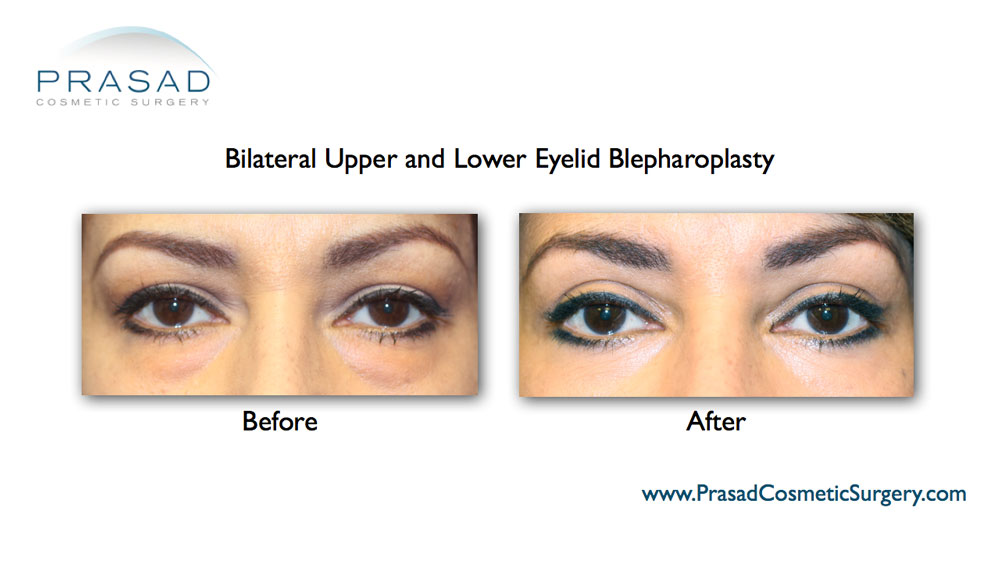
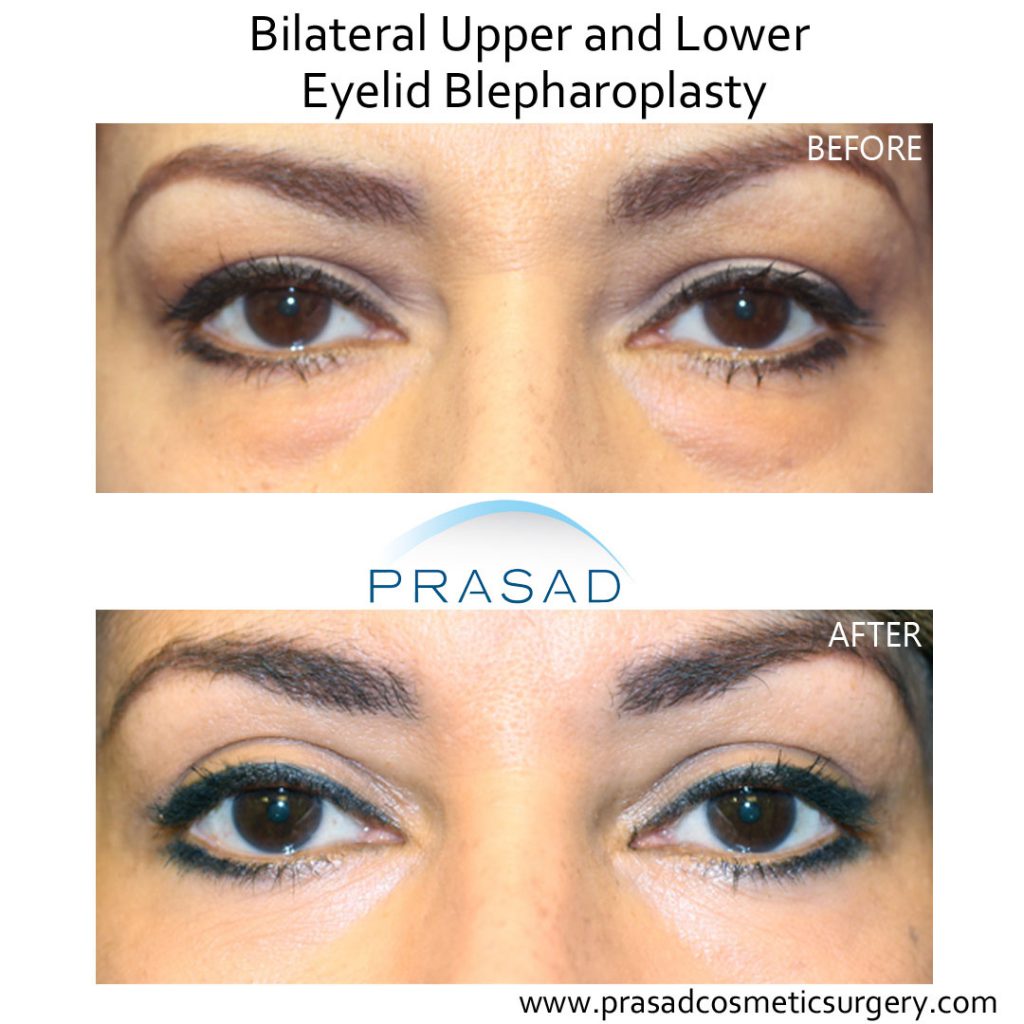
View more blepharoplasty before and after photos
When to Have Eyelid Surgery?
For many people, excess skin on the upper eyelids, puffy eyelids, and hooded eyes can be frustrating. Many of our patients note how applying makeup becomes difficult often resulting in smudging. The goal of the eye lift surgery is to restore the upper eyelids shape and contour, giving a more rested, refreshed appearance.
Often, hooded upper eyes occur with puffy under eye bags. Under eye bag surgery or lower eyelid blepharoplasty can be performed at the same time as upper eyelid blepharoplasty.
How Can Eyelid Surgery Help You?
- Improved aesthetic of the eye
- Rejuvenated appearance
- Alert and rested look – no heavy eyelids
- Improved vision in some patients (functional blepharoplasty)
Upper Eyelid Surgery Before and After
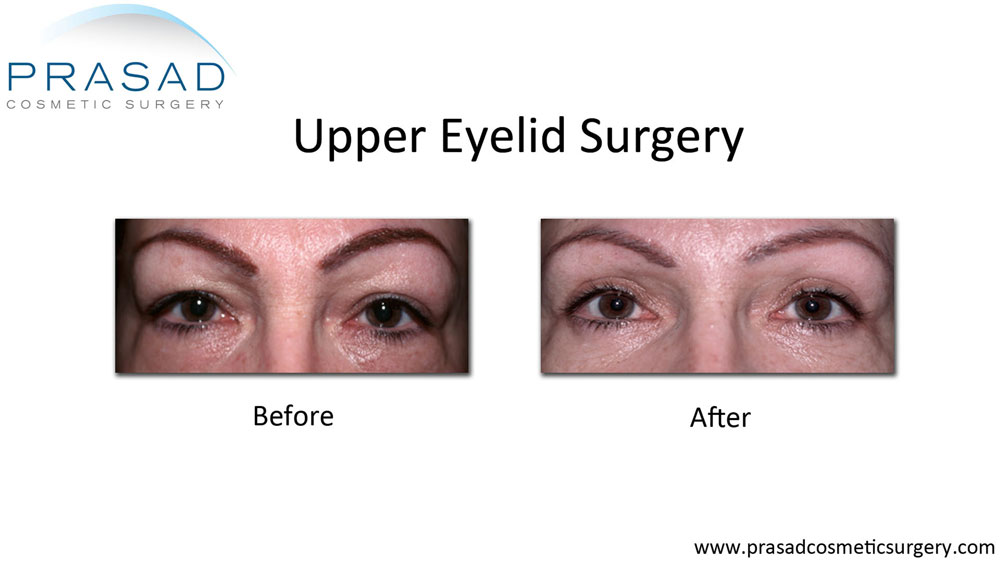
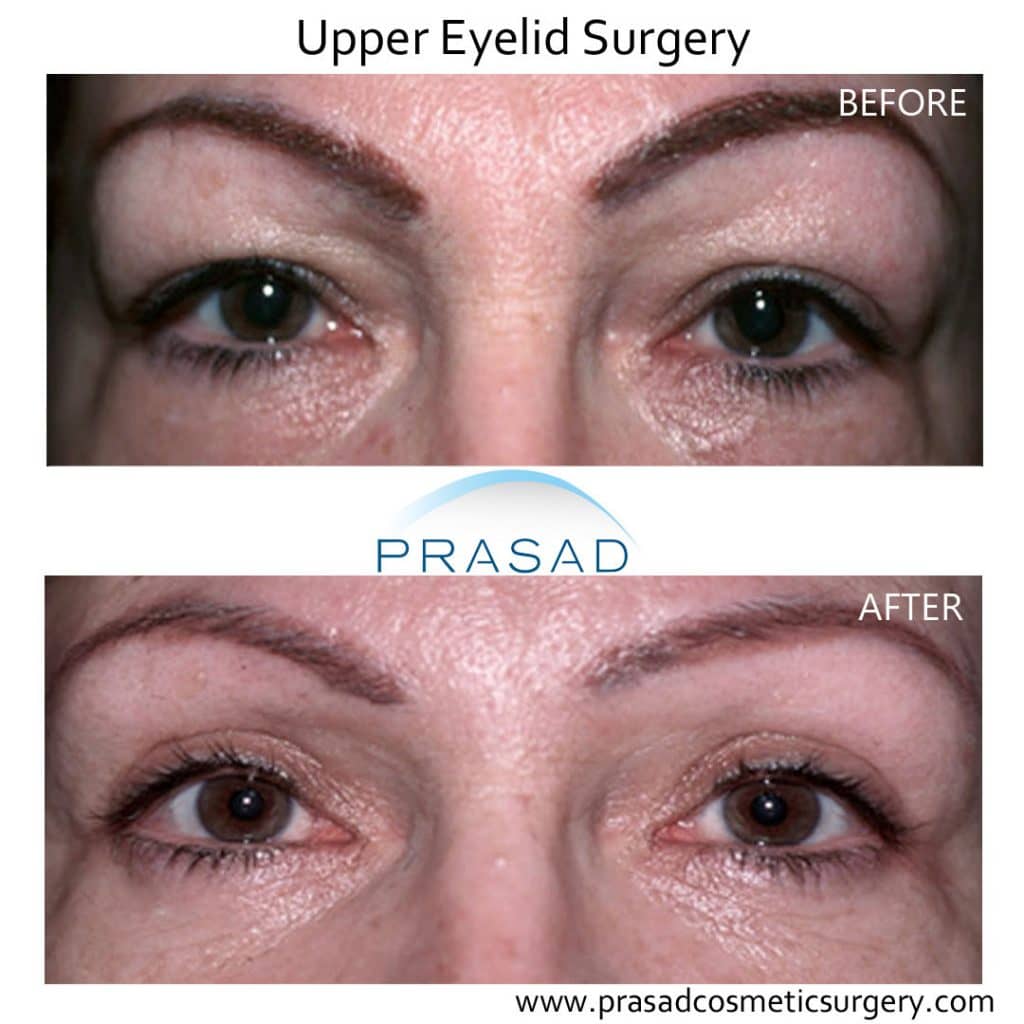
View more upper blepharoplasty before and after photos
What Happens to Eyelids as We Age?
Every blink causes the thinnest stretch of elastic fibers in the skin. Blinking also stretches fibers of the eyelid levator muscle (the muscle that raises the eyelid). As the area’s thinner skin begins to show fine lines, the overall underlying structure also ages. The skin sags and droops as the muscle layers weaken.
In our younger years, youthful volume normally gives the eyelid a full and supple appearance. This volume, created by fat and the supporting tissue, depletes over time. Resulting in the sagginess of the upper lid and appearance of eye bags on the lower eyelid. The prolapsing fat around the eye tends to shift forward in response to weakened, sagging muscles and support tissue.
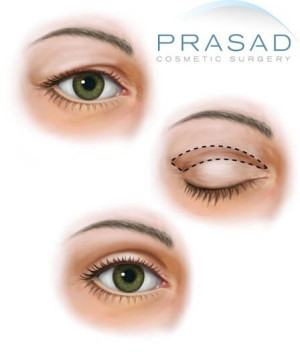
This shift results in the “puffy eyes” appearance or eye bags around the orbital (eye) area. Genetic factors can also contribute to premature appearance of eye bags in some people. Upper eyelid procedures can be done at any age depending on a combination of hereditary, environmental and age related factors.
The upper eyelid skin becomes excessive and hangs over the eyelid crease. The muscle behind the skin called the levator muscle can also be affected resulting in a condition called eyelid ptosis.
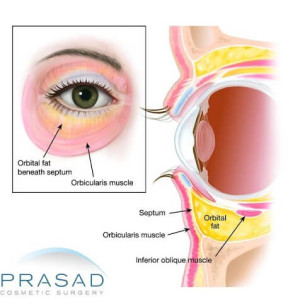
Why Do People Get Eyelid Surgery?
Here are the top eight reasons patients shared why they chose to have Dr. Prasad help them look their best.
- Friends, coworkers or employees keep asking you if you’re not getting enough sleep or tired.
- You’re concerned that you’re working in a field where you are being perceived as “older” or “less important”.
- People think you’re older than you are.
- You look in the mirror and your eyes look like they’re small or almost closed.
- The real shape of your eyes is being hidden by a fold of skin hanging over the lids.
- You’re Asian and you want to have a “double fold” or crease to make your eyes look brighter.
- You’re frustrated applying eyeshadow because your eyelids are heavy or droopy.
- As you’ve gotten older, the skin over your eyes is sagging.
With eye lift surgery, all patients will find that their face is significantly rejuvenated. They will be described as energetic, or well-rested, like they just came from a vacation. Women will find that eyeshadow is much more easily applied.
One Week After Upper and Lower Eyelid Surgery
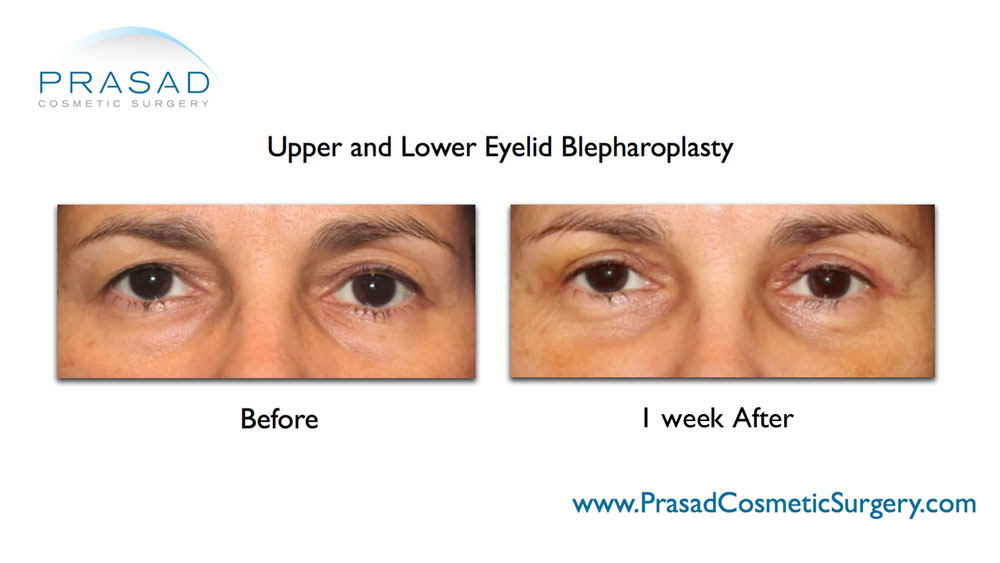
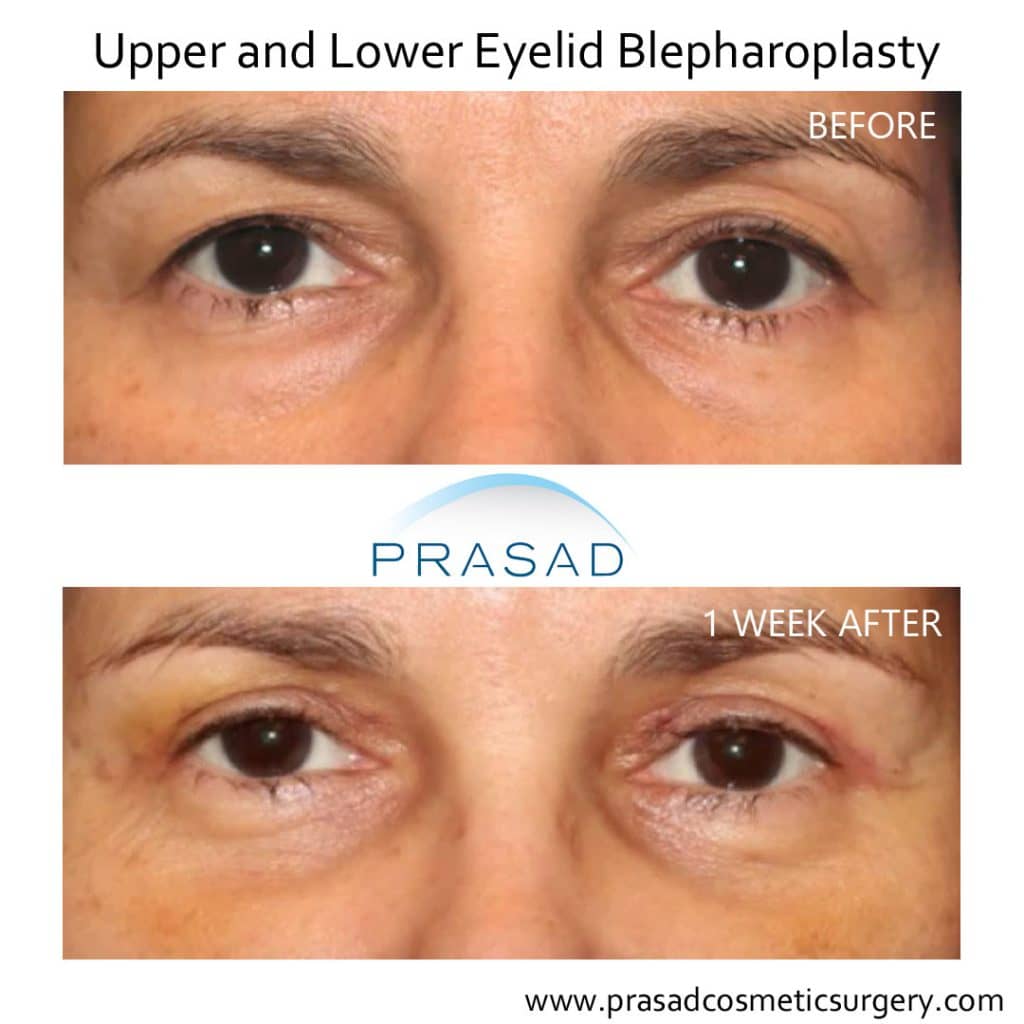
How is Upper Eyelid Surgery Done?
Prior to eye lift surgery, the area is cleansed and a local anesthesia is administered. Using his minimal incision technique, Dr Prasad removes excess fat and tissue on the upper eyelid. Then the skin and muscle are re-draped, and the incision is sutured closed. There tends to be less bruising when the eye lift surgery is done that way.
Upper eyelid surgery (blepharoplasty) is performed to remove hooding over the eyes. Lower eyelid blepharoplasty addresses the bags (puffy eyes) appearing under the eyes that give a person an exhausted expression. Upper eyelid surgery is performed through the lid crease and the scar is well hidden whether the eyes are open or closed.
What Kind of Stitches are Used in Eyelid Surgery?
Many of Dr. Prasad’s clients ask, “where are the stitches?” when they look in the mirror after the eye lift surgery is performed. Upper eyelid surgery is not just a simple removal of extra skin. In fact, the skin plays only a part of the procedure. Sculpting the soft tissue and creating a natural appearance is more of an art rather than technique alone.
Most doctors who perform upper eyelid surgery can do a decent job which many people find acceptable since they don’t know better. However, very few cosmetic surgeons perform exceptional eyelid surgery. Common issues Dr. Prasad sees often are people whose upper eyelid incision scars fall outside the crease. And can be seen when the eyes are open, or the crease incision is made too high on the upper eyelid.
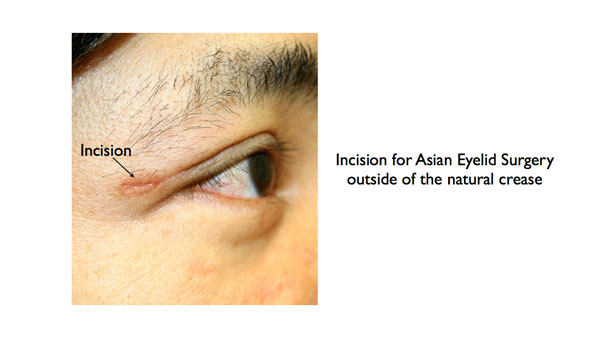
What Kind of Anesthesia is Used for Upper Eyelid Surgery?
Dr. Prasad’s eyelid lift procedures differ from many traditional upper eyelid surgery because it involves minimal risk, minimal anesthesia and maximal results.
Using local anesthesia with sedation (LITE™ Anesthesia) means less downtime after the procedure. Compared to an eyelid surgery performed under general anesthesia. In addition, general anesthesia has more attendant risks than local anesthesia, and there is a higher incidence of nausea.
So generally speaking, Dr. Prasad’s approach for a blepharoplasty is certainly a safer option. The incisions heal extremely well and are virtually imperceptible, even when the eyes are closed.
How Long Does Eyelid Surgery Take?
On average, eyelid surgery may last one to two hours, depending on the extent of treatment.
How Long Does it Take to Recover From Upper Eyelid Blepharoplasty?
Minimal bruising and swelling are typical after the eye lift surgery and tend to diminish within a week to ten days. Dr. Prasad’s patients benefit from the use of advanced regenerative medicine such as platelet-rich plasma to help them recover quickly.
Application of makeup can camouflage adequately for most people to go back to work within a week. Contact lenses can usually be worn in about one week after the procedure.
Blood thinning medications, herbal supplements or nutraceuticals can affect the recovery process. So it’s important to provide a list of all medications and supplements during your consultation at Prasad Cosmetic Surgery.
Upper Blepharoplasty Recovery
Upper Blepharoplasty Photos Recovery Day by Day
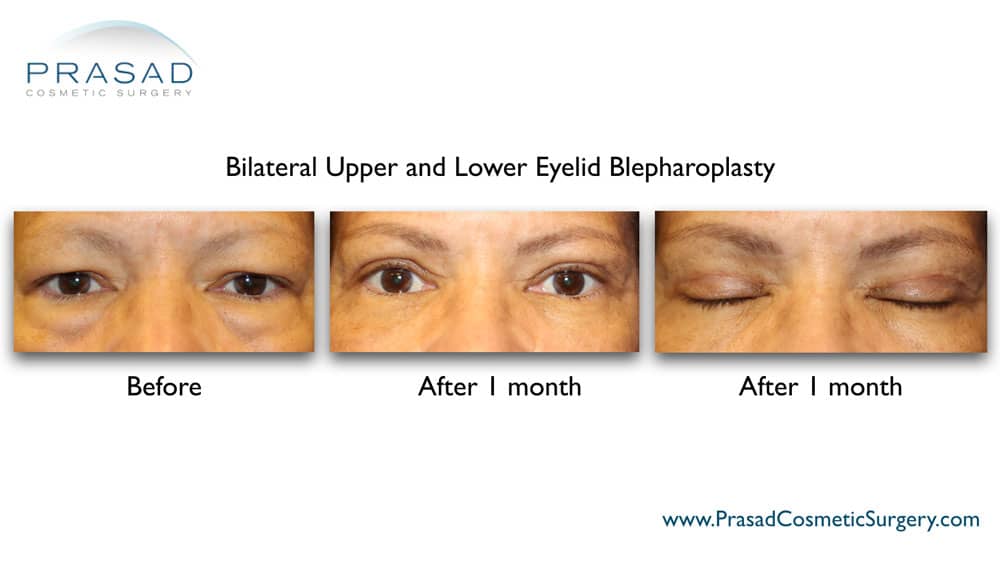
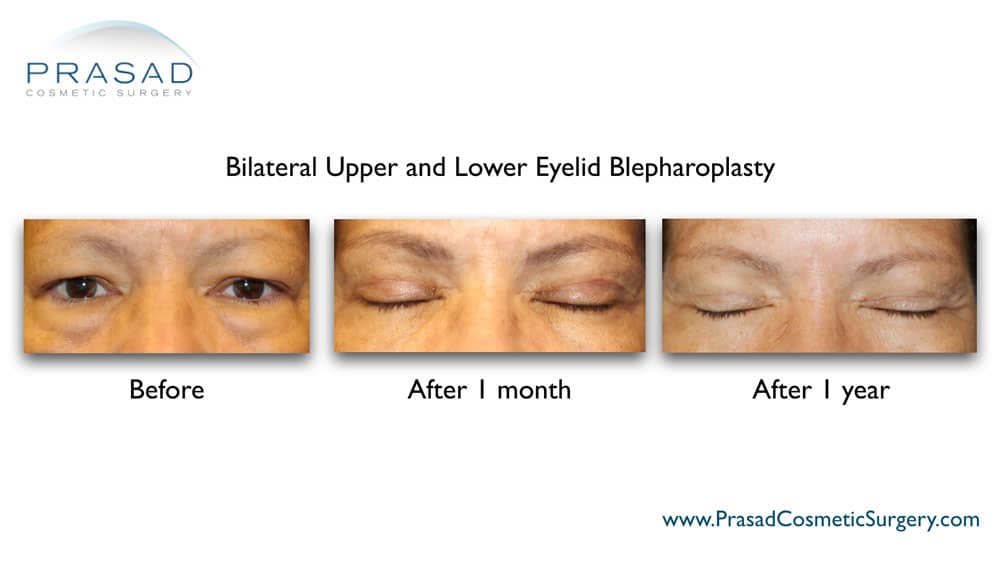
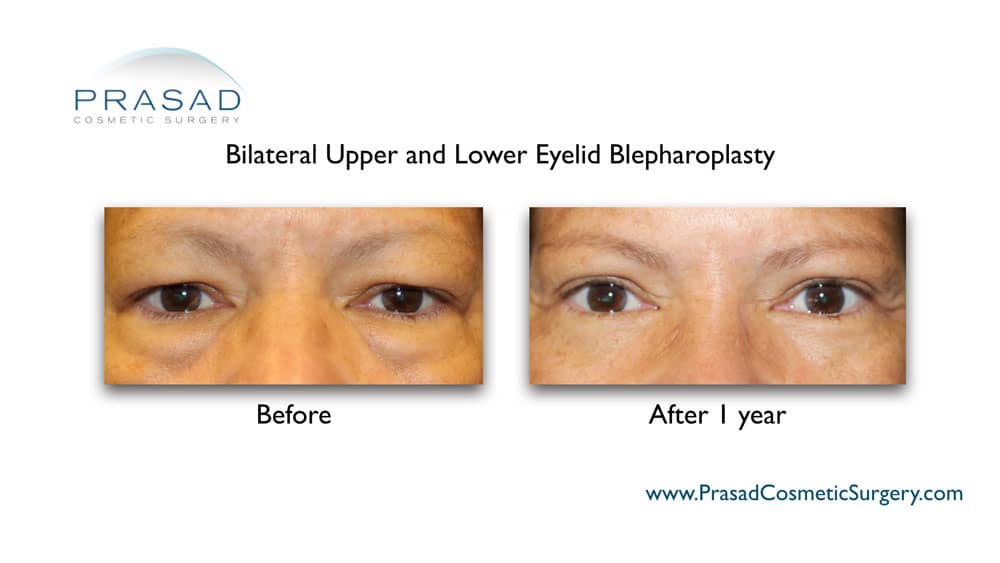
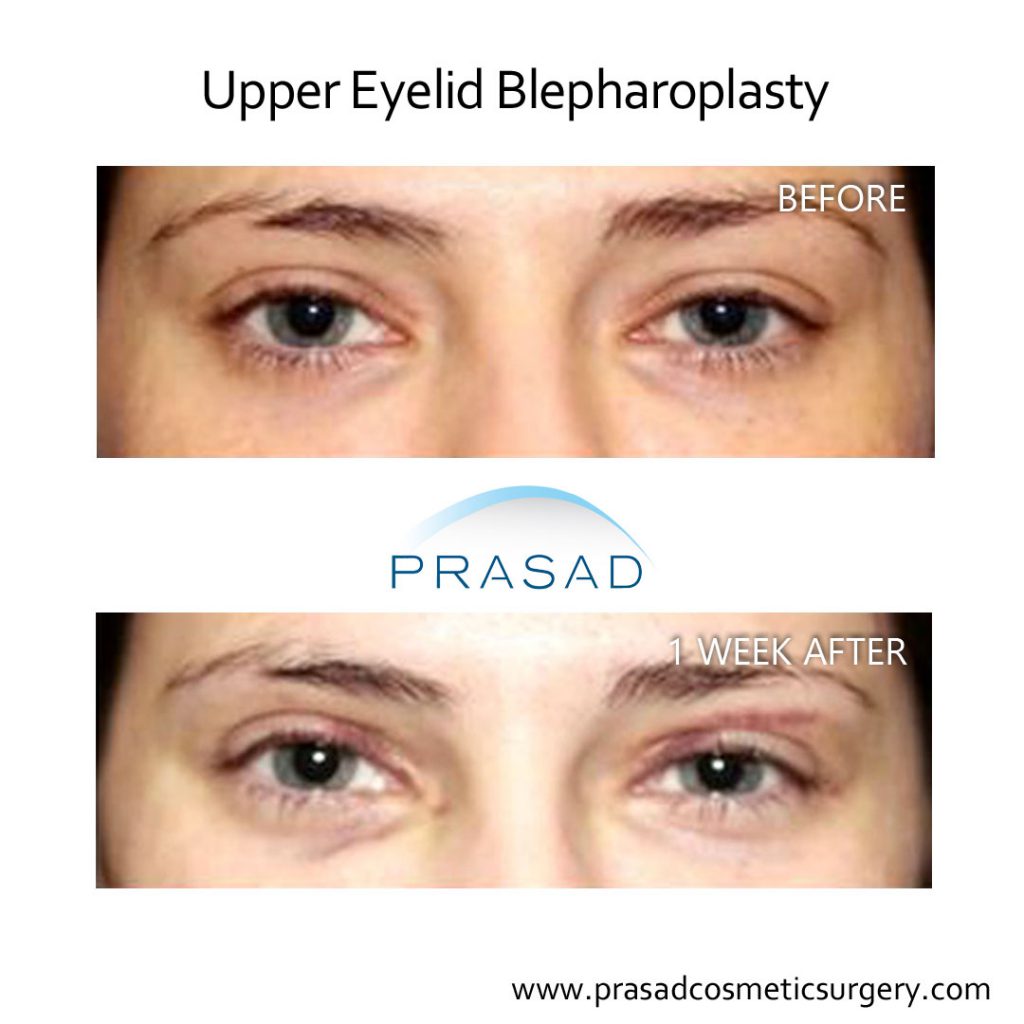
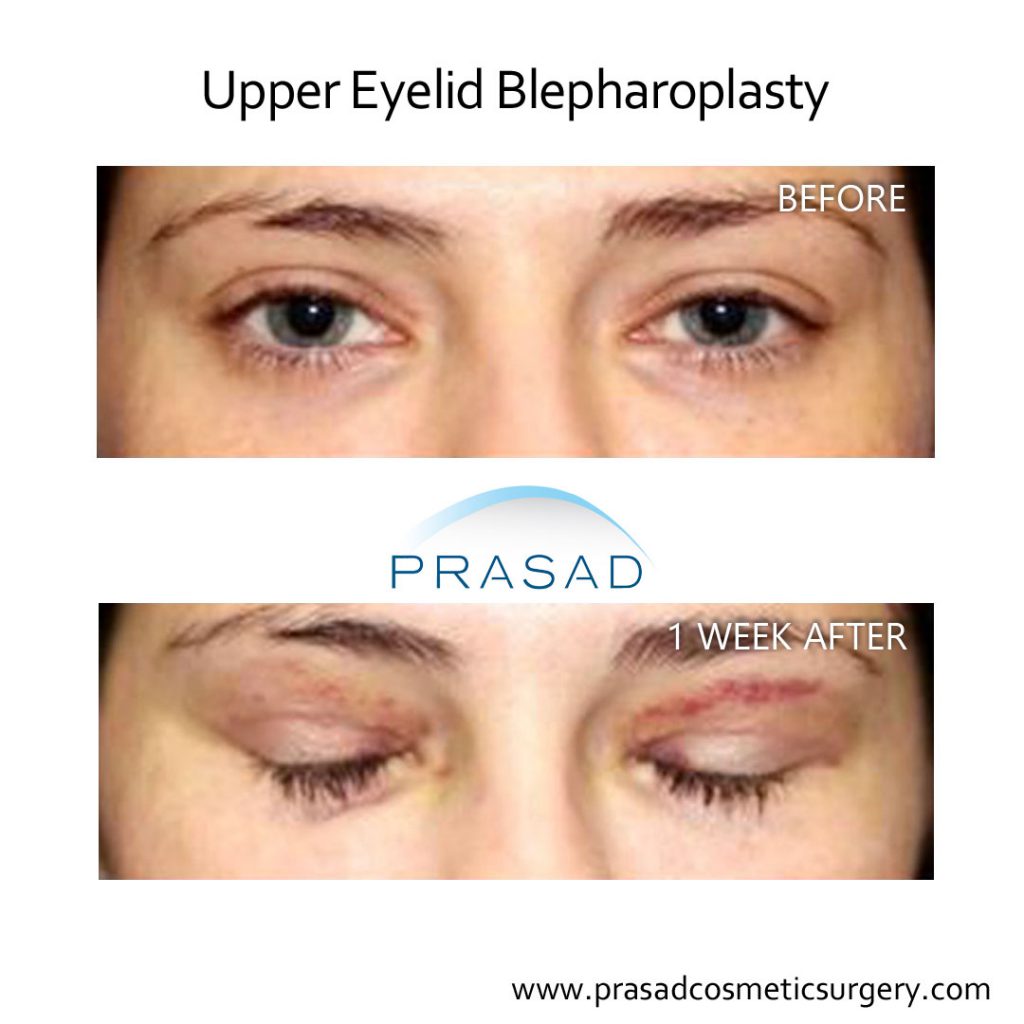
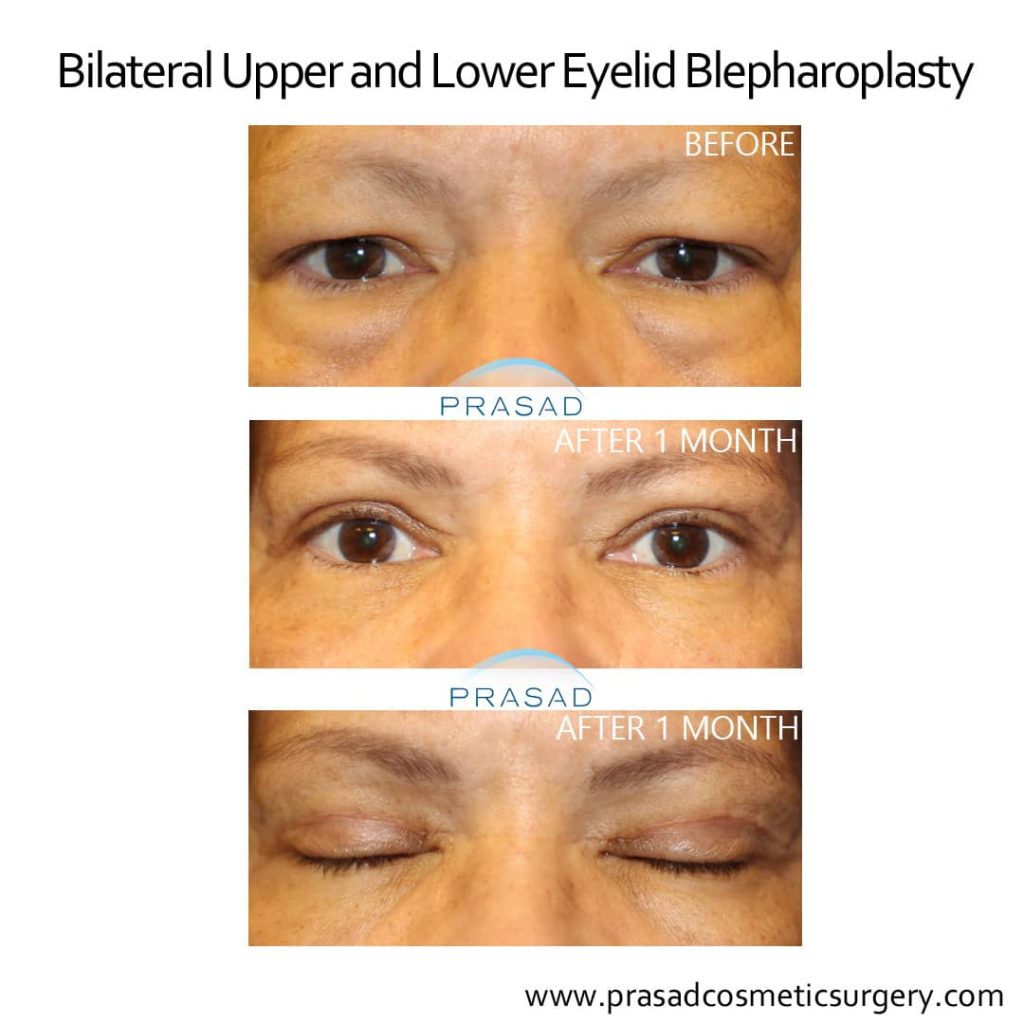
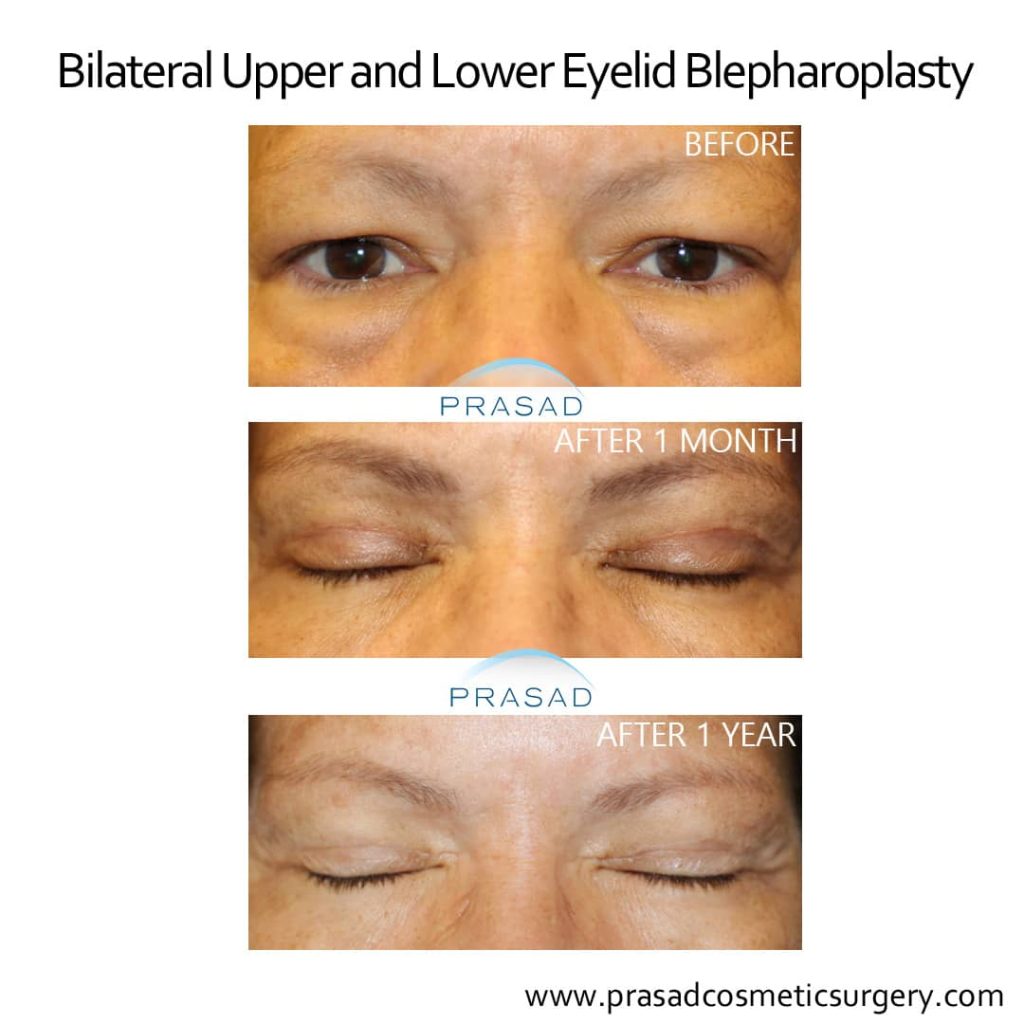
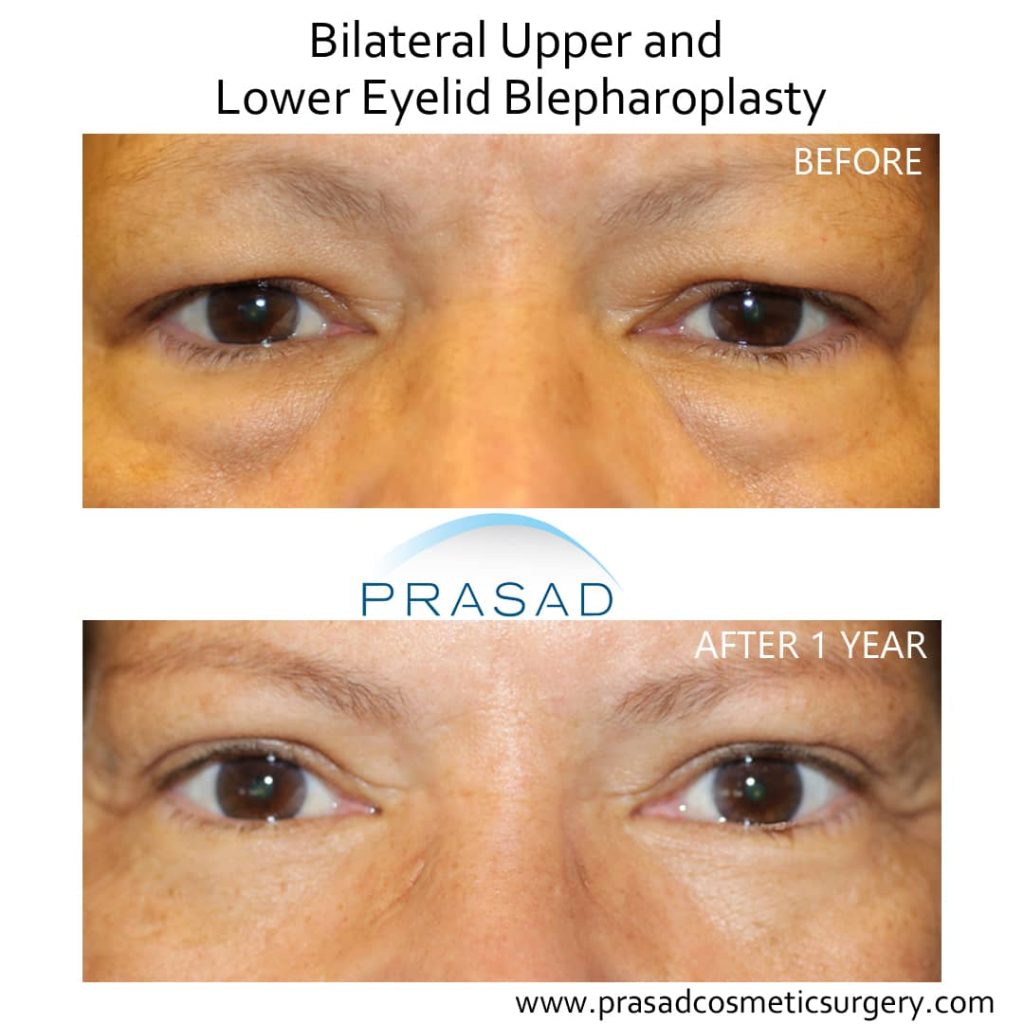
How Long Does Swelling Last After Upper Blepharoplasty?
Temporary swelling after upper eyelid surgery is common. However, in Dr. Prasad’s practice swelling has been greatly reduced. Through the use of local anesthesia with LITE® IV sedation to quicken recovery. Swelling in most upper eyelid surgery cases subsides within days.
Swelling from Asian double eyelid surgery may last longer, but not always longer than upper eyelid surgery done on other ethnicities. The amount of temporary swelling varies with individuals, with determining factors being: extensiveness of upper eyelid surgery, skin sensitivity, and individual anatomy.
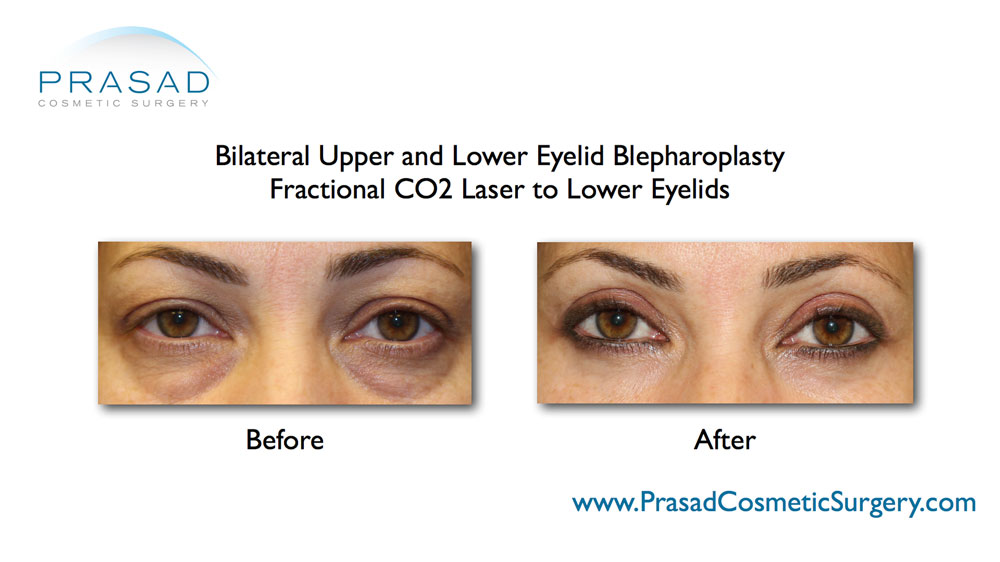
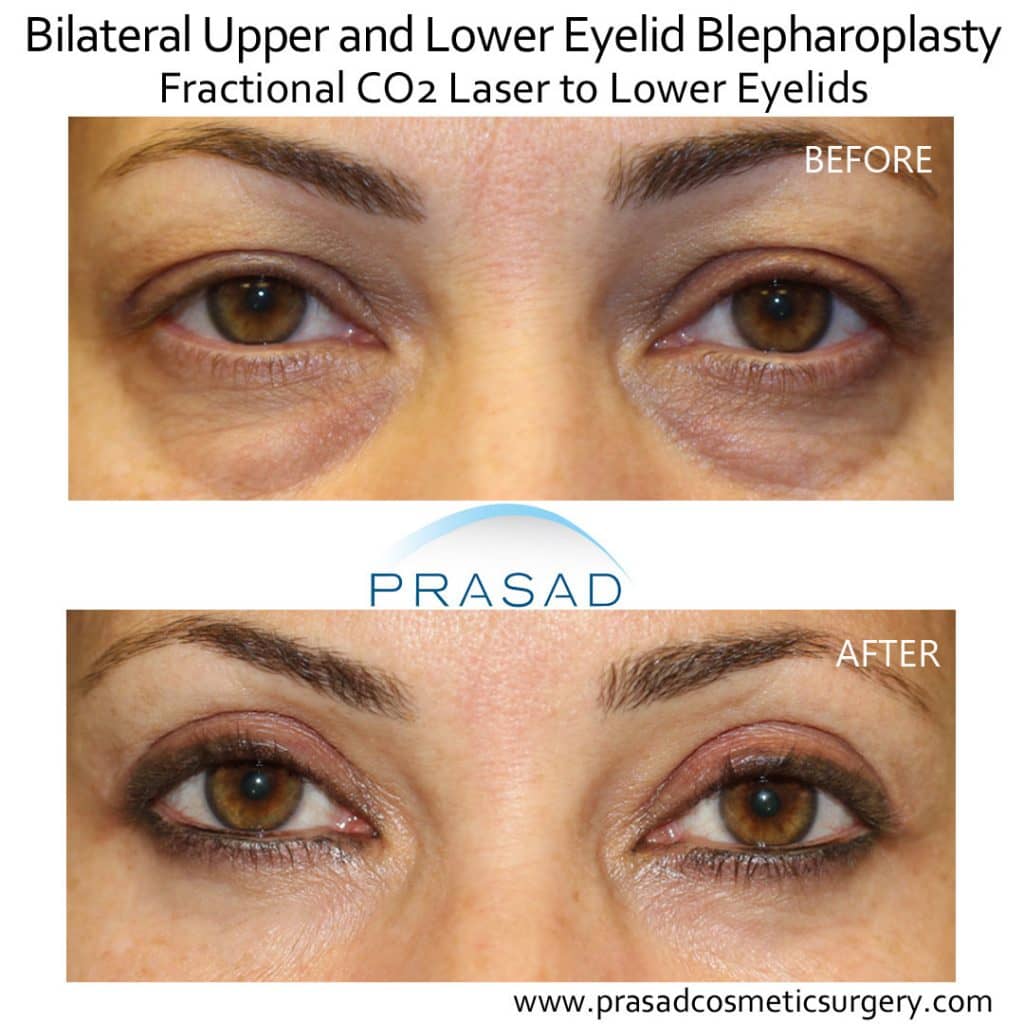
View eyelid surgery before and after gallery
Does Blepharoplasty Look Natural?
When performing an upper blepharoplasty, an experienced surgeon has to take into consideration the ethnic differences among patients. For example, the Asian eyelid is different anatomically in many ways, which is why specialized eyelid surgery is necessary to create natural results.
How Upper blepharoplasty Scars can be Minimized
What is Asian Eyelid Surgery?
Dr. Prasad has performed many Asian eyelid surgeries over his 20 years performing eyelid surgery. Special attention is needed in the central aspect of the upper eyelid and the epicanthal fold. This makes sure that the Asian eye is not “ Westernized”. For more information about Asian Eyelid surgery, visit our Asian Eyelid Surgery page.
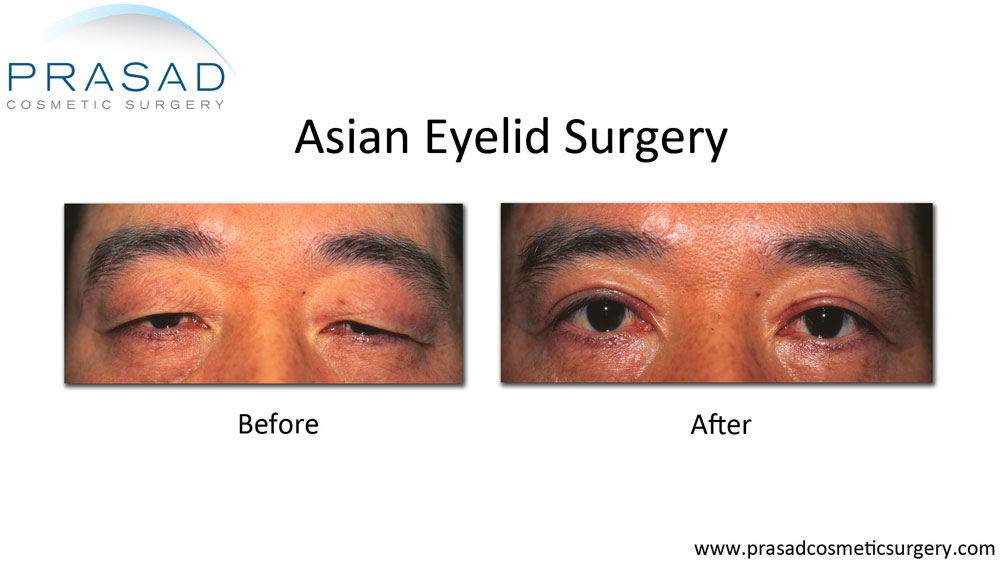
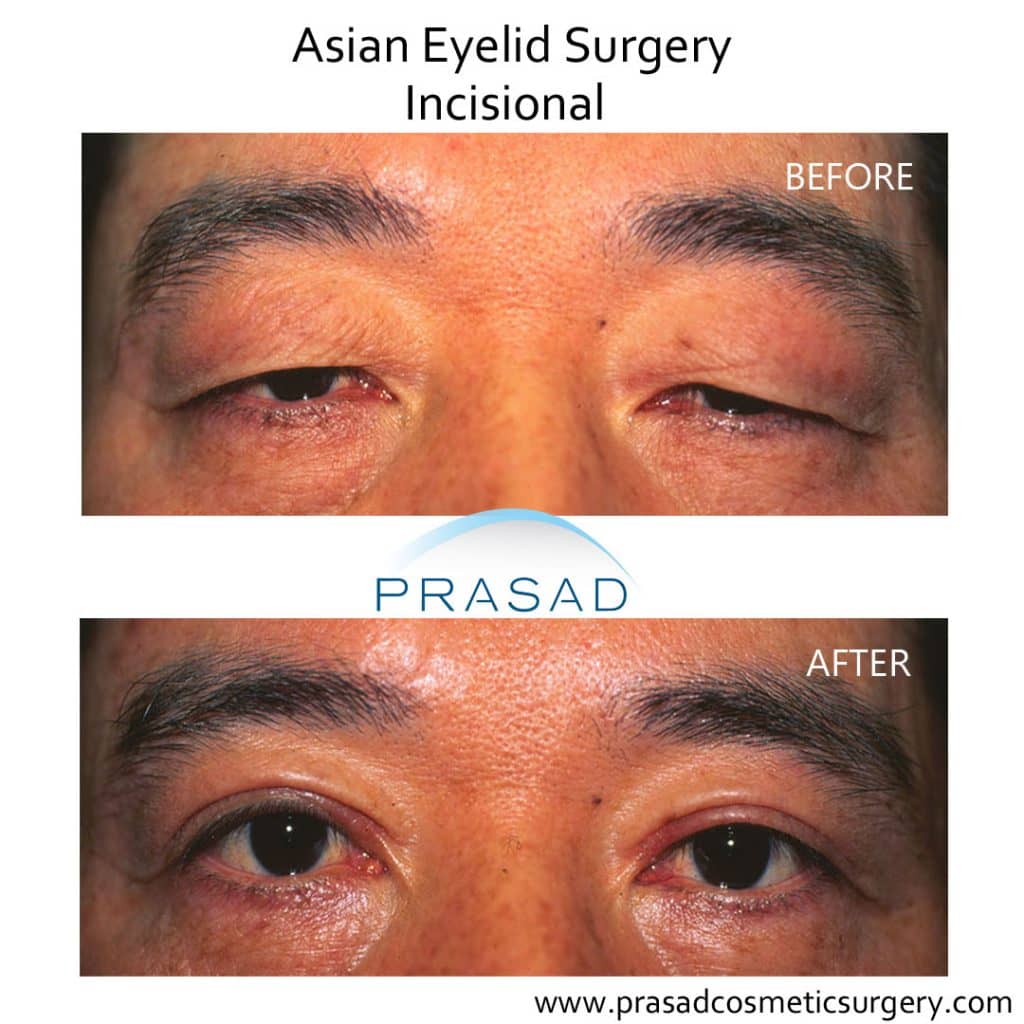
I Have Dark Skin, is Upper Blepharoplasty Right for Me?
Dark-skinned people should be aware that certain incisions heal differently when an eye lift surgery is done compared to lighter skinned people.
Blepharoplasty has a variety of important ethnic considerations, with skin color being one of them. Dark skin has more melanin (with added benefit of greater sun protection and less wrinkling). Dark skin is also more prone to thickened scars and placement of the incision is critically important to avoid obvious signs of surgery.
During upper eyelid surgery, an incision that is not optimally placed may result in a more visible scar. When a scar continues to grow during and beyond the healing period, a hypertrophic scar or even a keloid may develop.
Dr. Prasad has been a pioneer in eyelid surgical methods and educates other surgeons in the field of ethnic eyelid surgery. Dr. Prasad wrote an article entitled “Ethnic Considerations in Eyelid Surgery”.
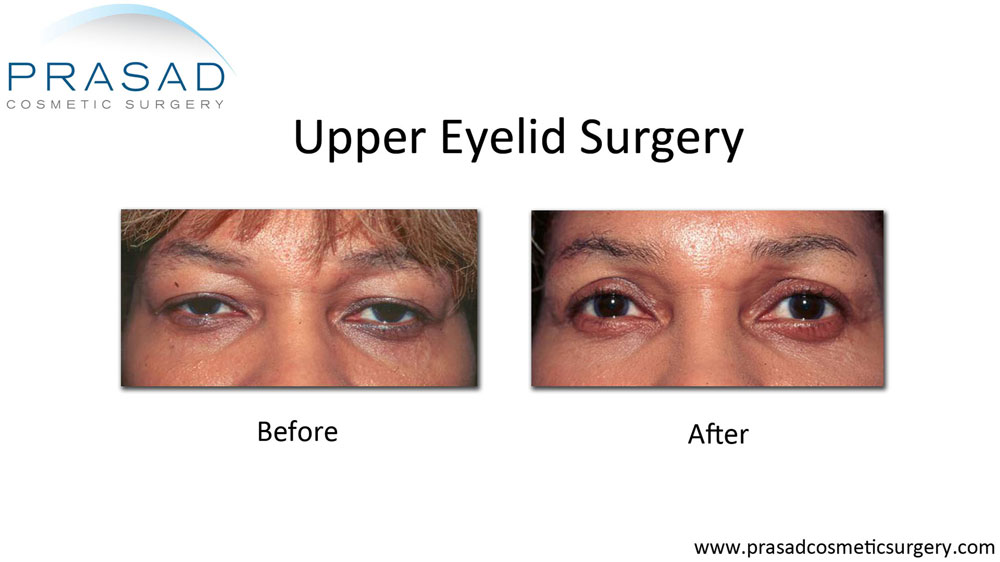
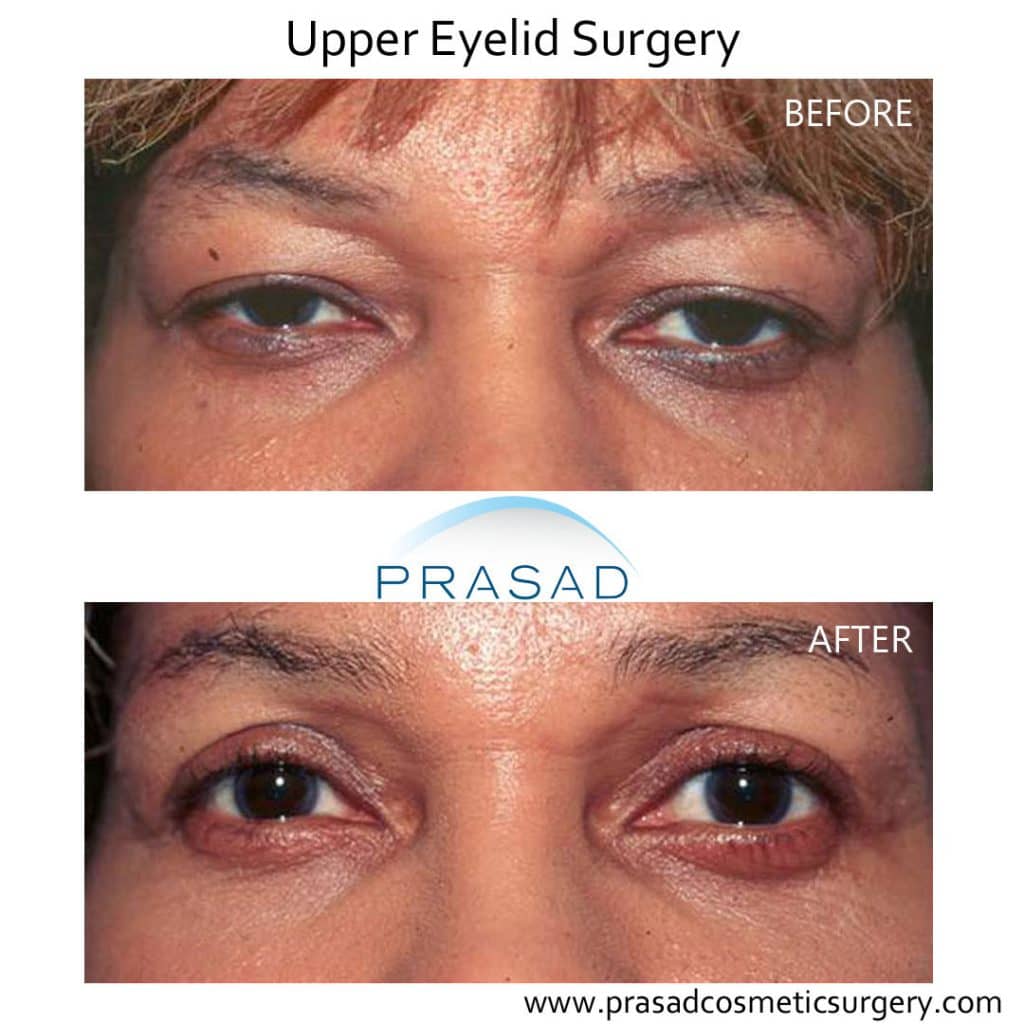
Men’s Upper Eyelid Surgery
A competent specialist knows how to differentiate the treatments used in male blepharoplasty from female eyelids. Just as he or she takes ethnic distinctions into account when doing an eye lift. It is a crucial and absolutely necessary distinction. Well known male actors have become very “plastic” in their appearance from having procedures more suitable for women.
For a man’s upper eyelid surgery to succeed, the patient must retain his masculine expression. A natural appearance has to be consistent with the anatomy of the eyes. Prior to the changes resulting in hooding of the upper eyelids and puffiness in the lower eyelids.
If a man’s eyelids were “full” in appearance at a younger age, a conservative and artistic procedure will maintain a “full” look that is more youthful. If the contours are not preserved during blepharoplasty, a man not only loses his individuality but assumes a more feminine expression.
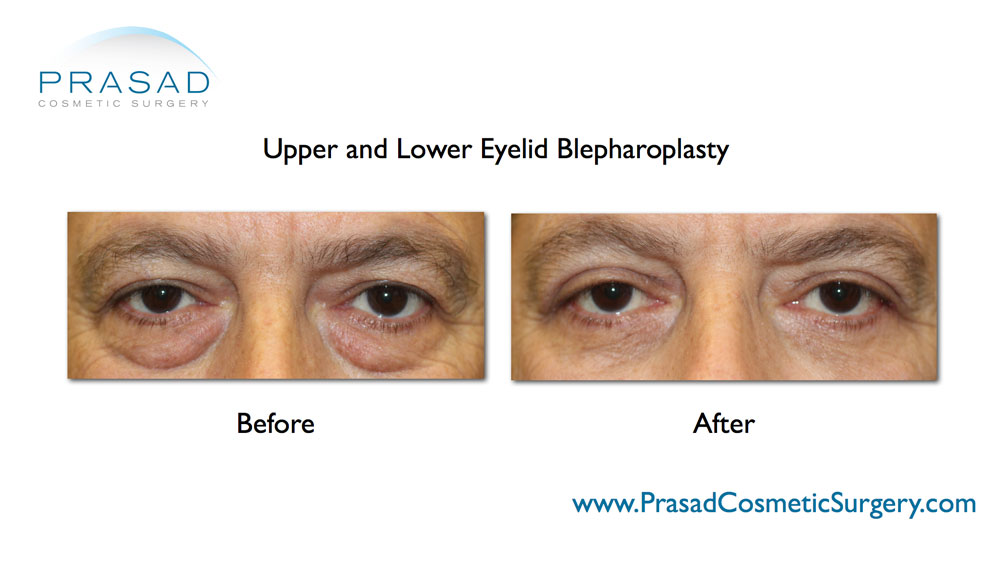
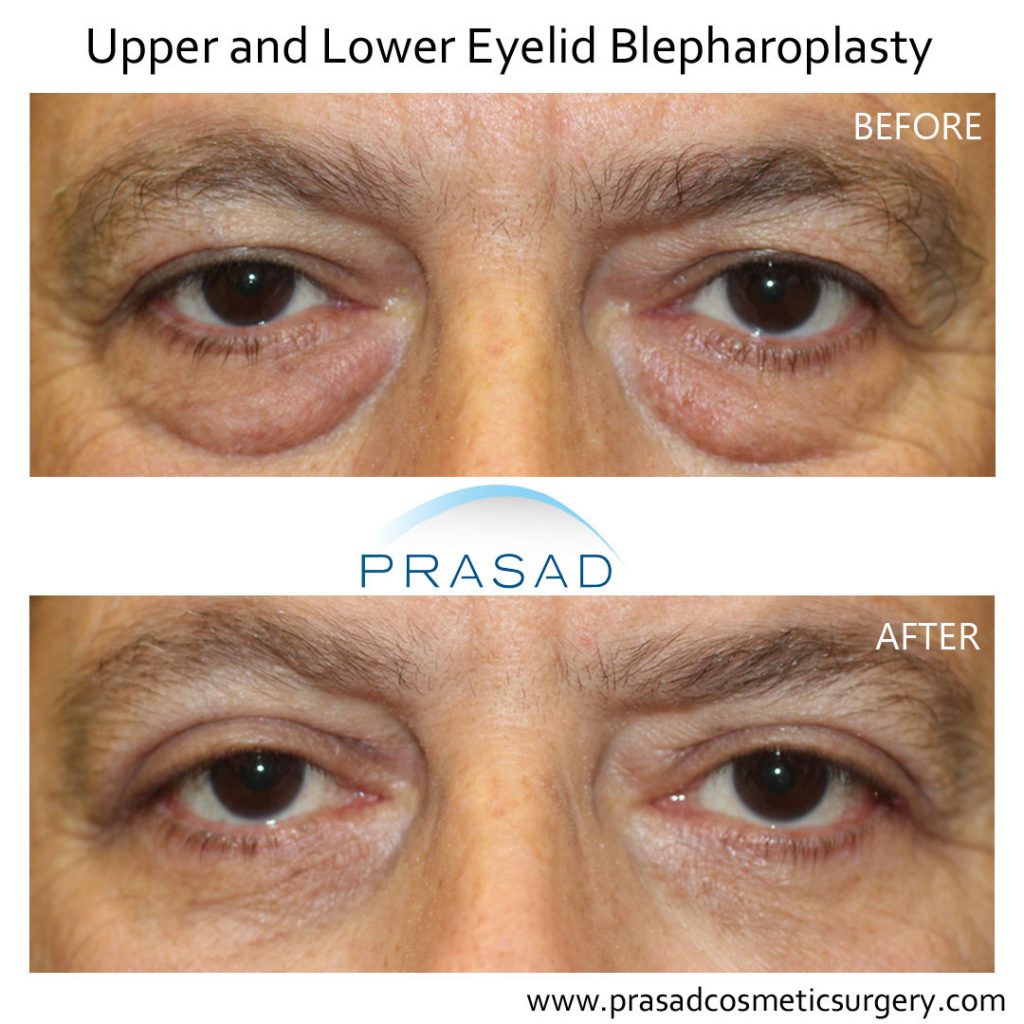
Best Blepharoplasty Surgeon in New York
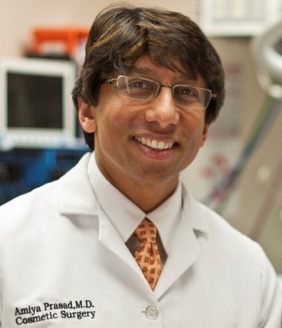
Dr. Amiya Prasad’s training and experience as an Oculoplastic surgeon far exceeds the standards of other plastic surgery boards. Surgery around the eyes is not to be taken lightly.
Every year, hundreds of people have complications from eyelid surgery and desperately search for specialists like Dr. Prasad. To help them correct and restore their eyes through highly specialized revision surgery. Based on this core belief of specialization as a way to provide higher level care, Dr. Prasad approaches his specialty of eyelid and facial rejuvenation surgery as a specialist. As opposed to the broad approach of general plastic surgery.
In addition, Dr. Prasad has distinguished himself by his artistic touch and exceptional skill in performing blepharoplasty or eyelid surgery. In practice since 1995, Dr. Prasad has established a reputation as one of the best eye plastic surgeons for cosmetic eyelid surgery. Dr. Prasad is a Cosmetic Oculofacial Plastic Surgeon and is Board Certified in General Cosmetic Surgery.
Fixing Upper Eyelid Blepharoplasty Complications
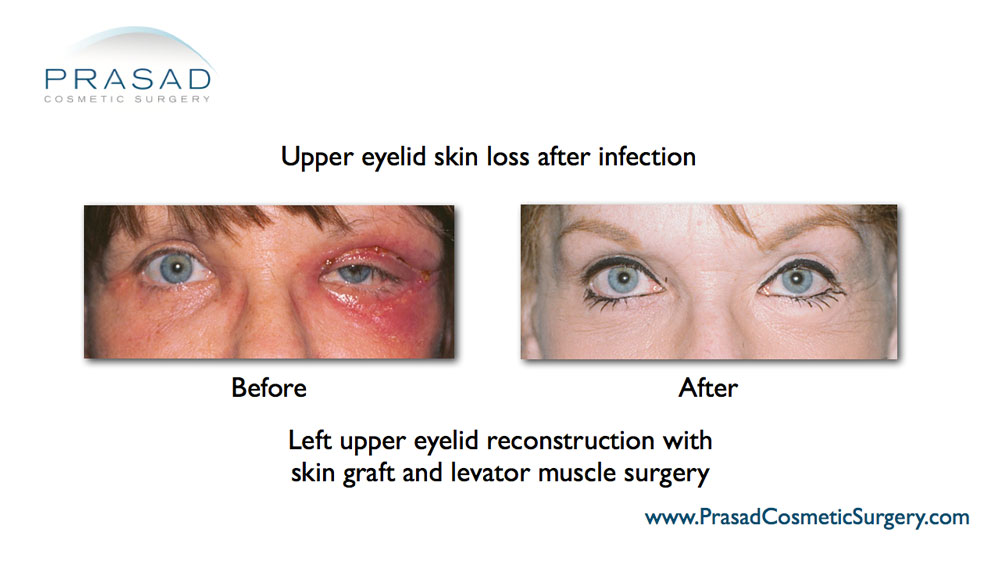
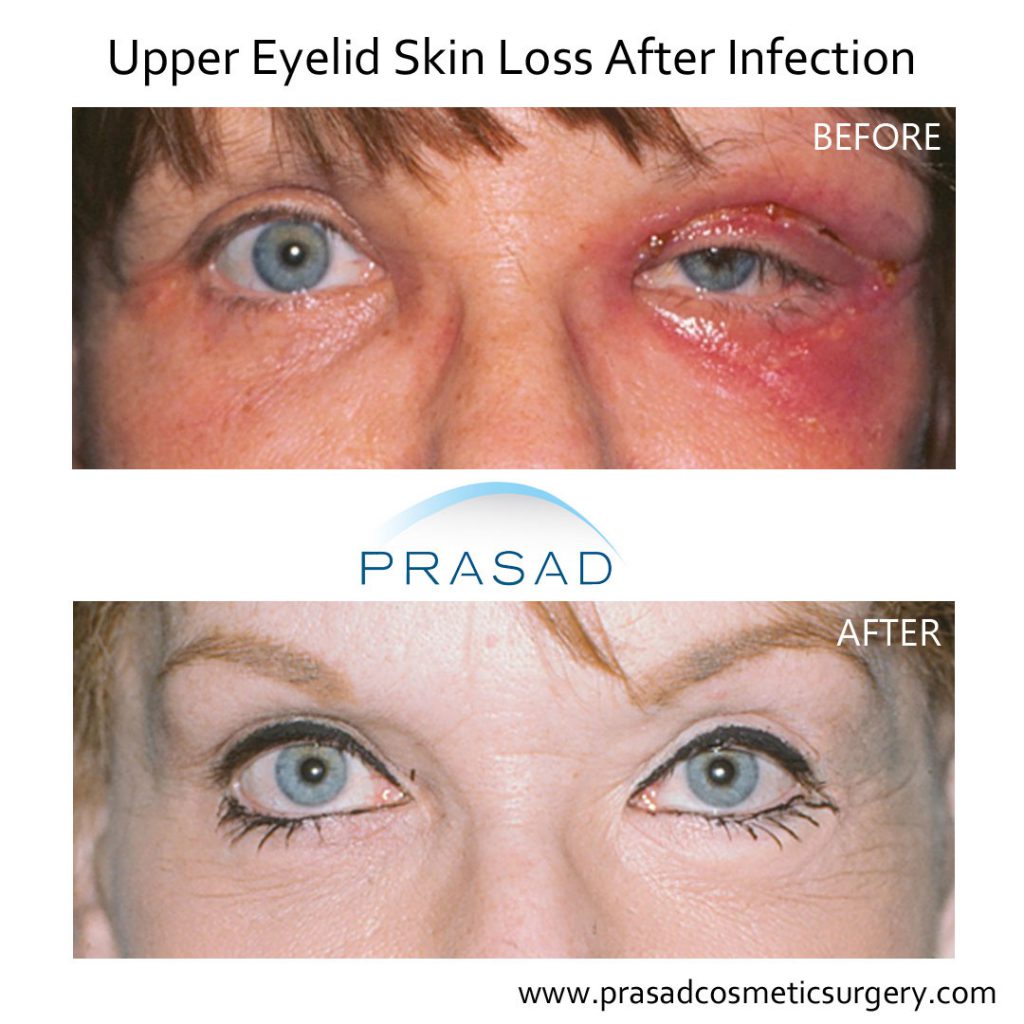
Being a super specialist in eyelid cosmetic surgery, oculoplastic surgeon Dr. Prasad has many advantages over other general plastic surgeons. However, competition and professional rivalry keeps many doctors from accepting their own limitations and performing procedures they are not trained enough to do.
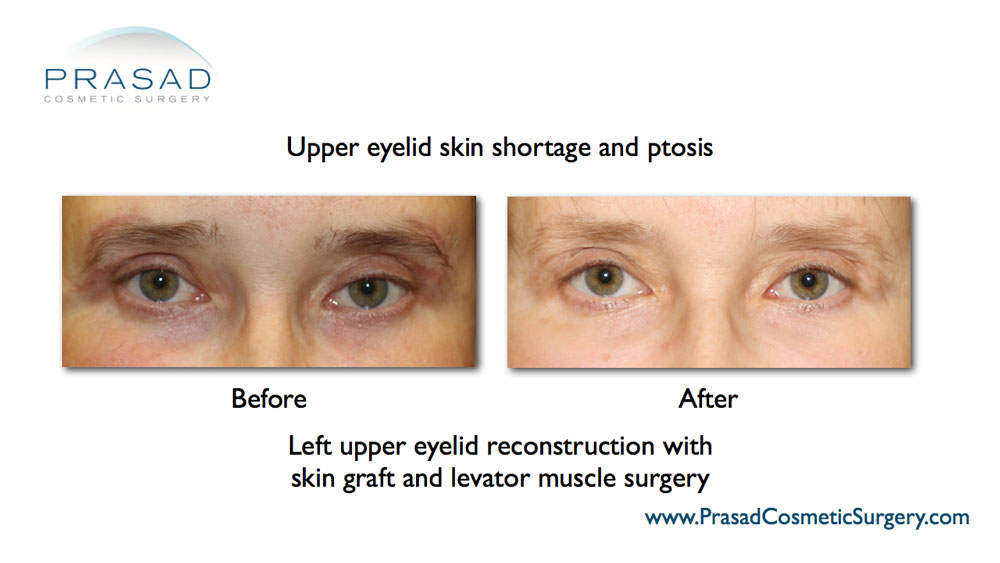
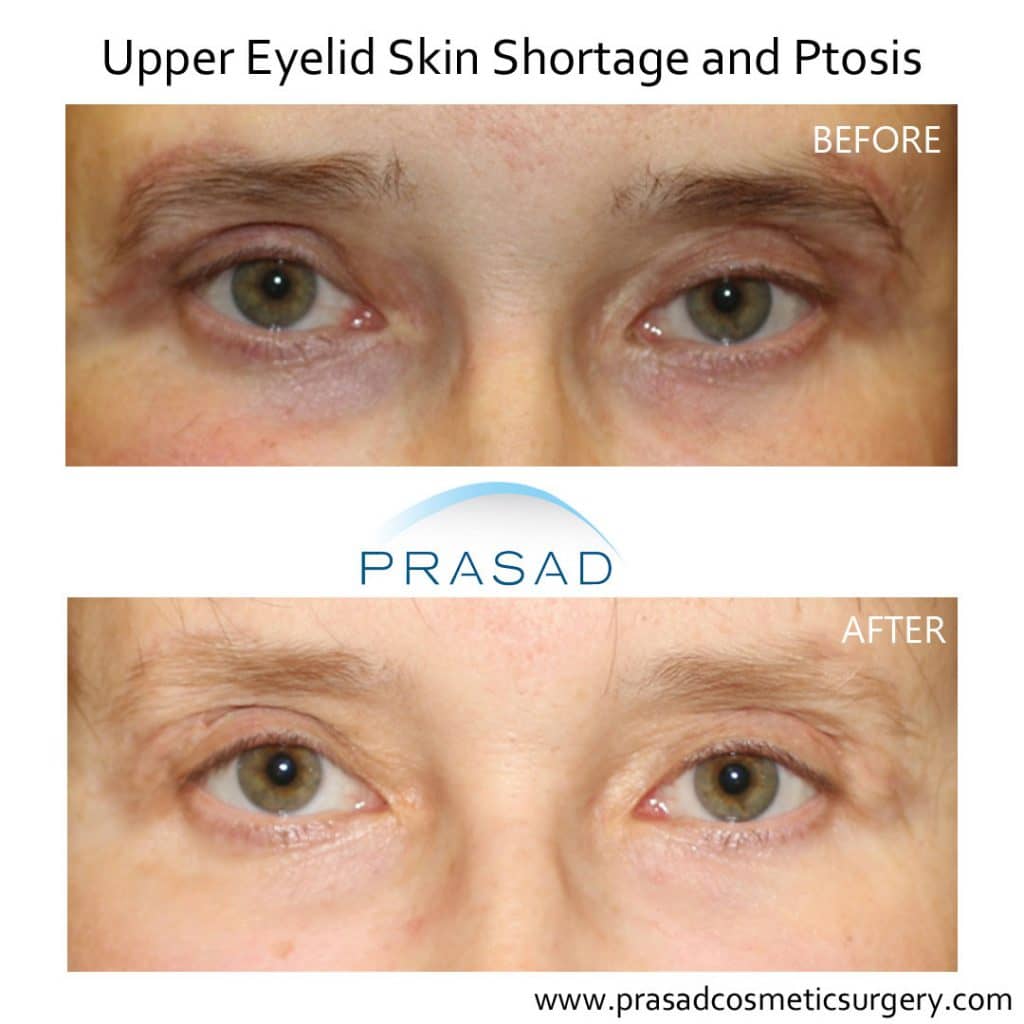
Patient Reviews on Upper Eyelid Surgery
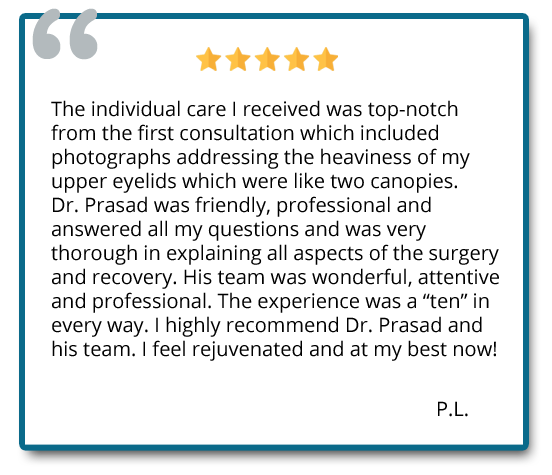
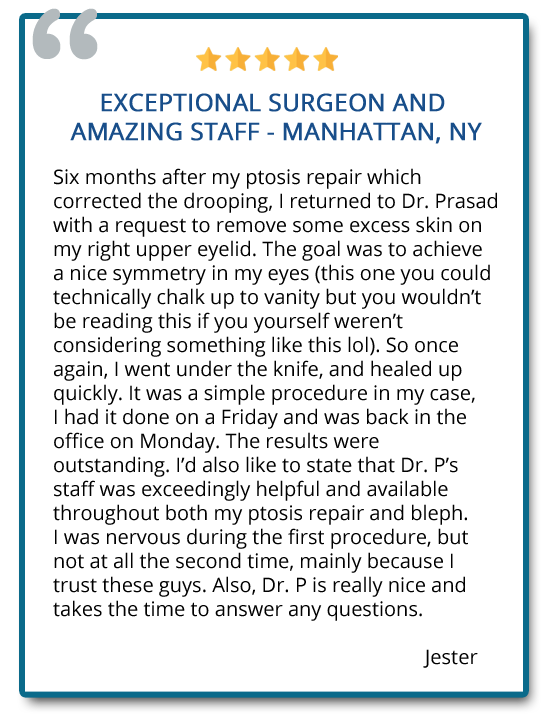
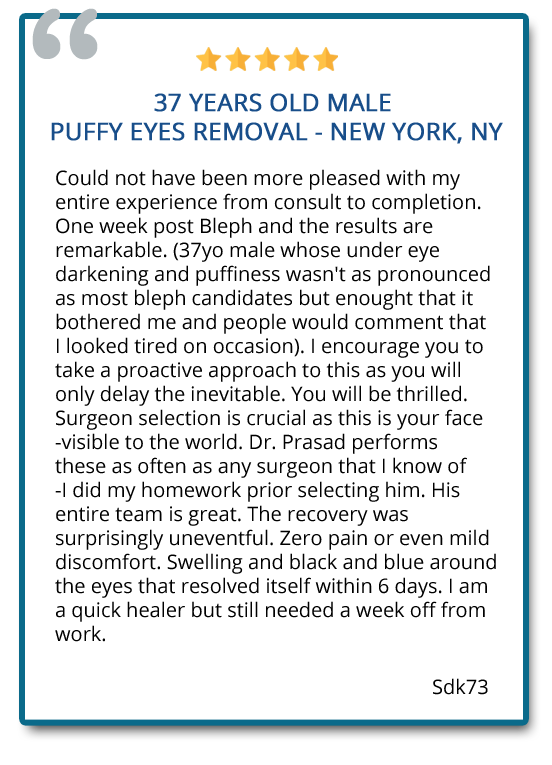
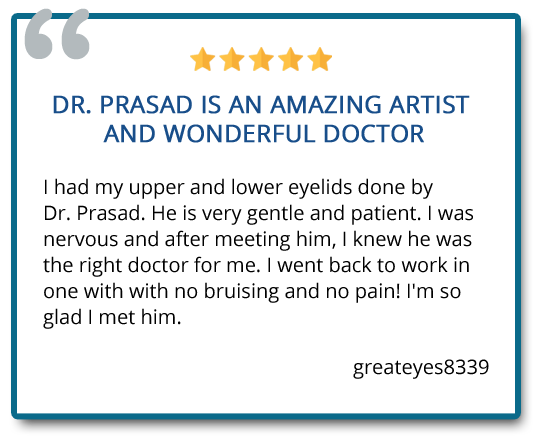
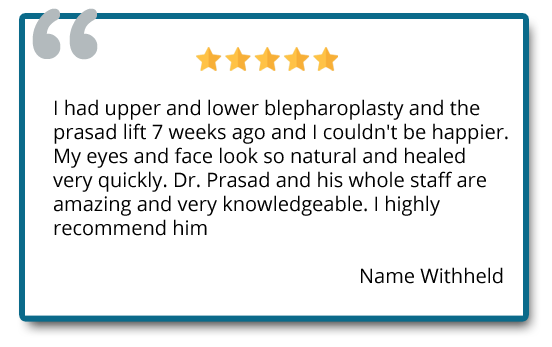
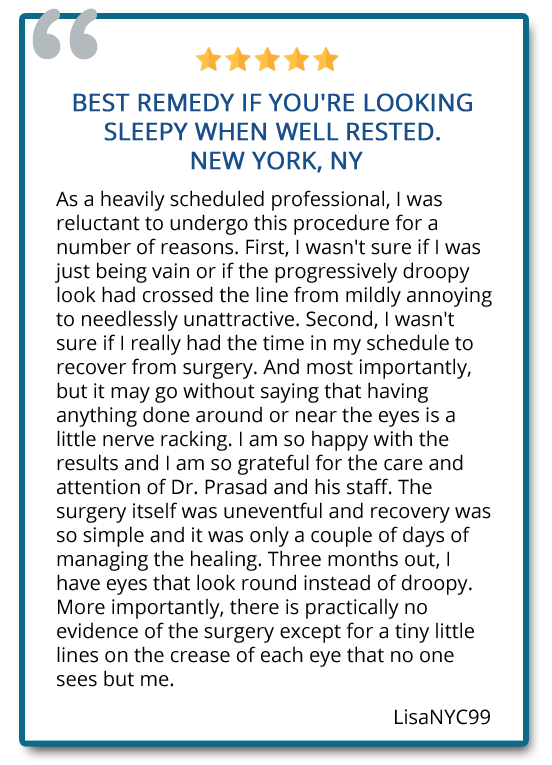
Frequently Asked Questions (FAQs)
How much does upper eyelid surgery cost?
The cost of surgery is based on the surgeon’s fee, anesthesia, and facility costs. Safety and comfort are very important for the success of your procedure. The cost of the eye lift surgery varies from patient to patient, and depends on the surgeon’s evaluation of your needs.
Can botched upper eyelid surgery be fixed?
Dr. Amiya Prasad is an oculofacial plastic surgeon. In the medical community, oculofacial plastic surgeons are recognized as super specialists of eyelid surgery. With some like Dr. Prasad specializing in cosmetic eyelid surgery, eyelid reconstruction, and revision surgery.
His experience, expertise, and natural aesthetic style help people get it right the first time with their primary eyelid surgery. As well as people with eyelid surgery complications from other surgeons with revision surgery. Thus, gives him a respected position among cosmetic, and oculoplastic surgeons.
What is a good age for blepharoplasty?
When the eyes look tired or dominate your facial appearance in a negative way, this is the time to consider eyelid surgery. Since many of these traits are hereditary, Dr. Prasad has patients for whom he’s operated on for three generations within the same family. He routinely performs these procedures for patients as young as 20s, all the way up to their 80s and beyond. Dr. Prasad makes an assessment of the patient’s health and physical age to determine if they are able to undergo eyelid surgery.
Is Laser Blepharoplasty Better?
Lasers have many different uses, but a laser does not replace a skilled surgeon. A laser is a tool which can be used effectively in the hands of a surgeon to enhance the results of the surgery and to minimize recovery time. Dr. Prasad will discuss with you if you are a candidate for laser blepharoplasty.
Why can’t you wear contacts after eyelid surgery?
Contact lenses can be worn about a week after eyelid surgery. The reason for this is antibiotic ointment is applied to the stitches and some degree of temporary dryness is expected after eyelid surgery.
Can upper eyelid surgery be done with local anesthesia?
Dr. Prasad favors local anesthesia with IV sedation when performing blepharoplasty as it puts the patient in a relaxed, sleepy state. Less strenuous to the body compared to the eyelid surgery performed under general anesthesia.
Follow link for more upper eyelid surgery FAQ videos
Schedule a consultation with Dr. Prasad to determine the best procedure for you. Contact us at our Manhattan office at (212) 265-8877 or Garden City Long Island Office at (516) 742-4636. Patient Financing options available for qualified candidates.
Upper Eyelid Surgery Manhattan NYC and Long Island, New York
Schedule a consultation with Amiya Prasad MD to determine the best procedure for you. Contact us at our Manhattan office at (212) 265-8877 or Garden City Long Island Office at (516) 742-4636 or fill up the form below.
